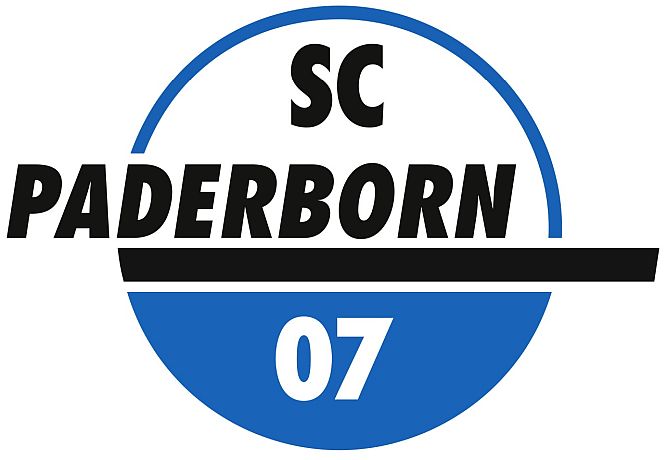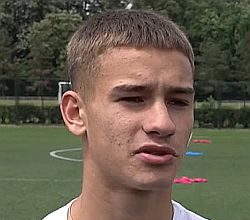SC Paderborn’s Youthful Charge: Five Talents Shaping the Club’s Bundesliga Push by Adam Khan

With just four points separating first from ninth place, the 2. Bundesliga is once again delivering a gripping promotion race where the slimmest of margins will determine which teams soar to the Bundesliga or sink into mid-table anonymity. Over a third of the season has passed, yet remarkably, at least 12 of the 18 clubs remain serious contenders in the battle for promotion.
Still, some teams seem like fleeting challengers, while others exude the consistency needed for a genuine push to the top. SC Paderborn belongs firmly in the latter category. Hailing from a quaint West German town better known for its stunning cathedral than for footballing dominance, Paderborn has emerged as an unlikely leader in a competitive 2. Bundesliga that is home to fallen giants like Schalke 04 and Hamburg SV.
At the heart of Paderborn’s success is Lukas Kwasniok, one of German football’s most exciting coaching talents. Under his leadership, the team has embraced a bold, courageous, and combative playing style that routinely defies the club’s modest financial means and tempered expectations.
Lacking a vast fanbase or wealthy backers, Paderborn’s rise as a promotion challenger hasn’t come through extravagant spending. Instead, they’ve leaned on ingenuity, focusing on shrewd recruitment, professional academy structures, and a commitment to nurturing young talent. With an average squad age of just 24.6 years, the club boasts the third-youngest roster in the league, with promising prospects at the core of their bid to return to the Bundesliga for the first time since 2020.
In this analysis, Adam spotlights five standout U23 players who are playing pivotal roles in SC Paderborn’s remarkable campaign.
Santiago Castañeda – 20 years
It’s no exaggeration to say that Santiago Castañeda has been one of the breakout stars in German football this season. The 20-year-old American-Colombian dual national joined on a free transfer this summer, arriving with little fanfare after just one professional campaign with MSV Duisburg—a team that suffered a dismal relegation to the fourth tier last season. Despite playing over 31 matches in the 3. Liga, expectations were understandably modest, and many even foresaw Castañeda’s initial integration with the U23 outfit in the Regionalliga West. However, Castañeda has defied all projections, not only securing a starting spot in Lukas Kwasniok’s midfield but quickly establishing himself as one of the squad’s most influential players.
Castañeda has started all 13 of Paderborn’s 2. Bundesliga fixtures this season, missing just 25 minutes of action. His physicality and athleticism immediately stand out. At 1.91m tall, Castañeda’s ectomorphic frame gives him an extraordinary lower body reach, enabling him to execute precise sliding tackles and cover ground with remarkable efficiency. Unlike many players of his stature, his agility and mobility remain undiminished. Castañeda is a relentless presence, winning possession aggressively and driving forward with explosive runs through midfield. His dynamism, imposing physique, and combative defensive play evoke comparisons to one of the Bundesliga’s standout holding midfielders of the past decade, Denis Zakaria.
Yet, for all his promises, there are still clear areas for growth. Castañeda’s passing remains very conservative, often lacking the progressive, line-breaking quality required to dictate games at the highest level. Furthermore, striking the right balance between his highly impactful, front-footed defending and the risk of leaving exploitable gaps remains a key area for Castañeda’s development. While impactful, his aggressive style can sometimes compromise his team’s defensive structure and force him into late challenges. This is evident in his disciplinary record: only Denis Srbeny has committed more fouls in the 2. Bundesliga this season, and last year in the 3. Liga, Castañeda received 10 yellow cards in 31 matches.
Nonetheless, Castañeda’s trajectory is unmistakably upward. With his unique skill set and relentless energy, it’s likely only a matter of time before he catches the attention of either the United States or Colombia for international duty at the youth or senior level.
Luis Engelns – 17 years
Despite only turning 17 in March, Luis Engelns has quickly become an integral part of Paderborn’s first team, starting their last four 2. Bundesliga matches. Considered the brightest prospect to emerge from SC Paderborn’s underappreciated academy, Engelns has drawn widespread praise for his maturity and immense potential. Manager Lukas Kwasniok has even mentioned that Engelns could have joined the first team earlier if not for his school commitments, which initially made it challenging for him to train regularly with the senior squad.
Since October, Engelns has become a fixture in Kwasniok’s side, where his relentless energy and work rate have been instrumental in Paderborn’s 3-4-3 system. Playing alongside Santiago Castañeda in the double pivot, Engelns covers extraordinary ground, a necessity in their high-intensity setup. In just 299 minutes of 2. Bundesliga action, Engelns has already covered 40.6 kilometers—an average of over 12 kilometers per 90 minutes. This remarkable movement not only helps close down defensive zones, but is also a driving force for his highly-impactful late runs into the final third. Engelns has a knack for timing his surges beyond opposition lines and consistently finding goal-scoring positions around the penalty area.
However, reducing Engelns’ contributions to just his work rate would understate the breadth of his abilities. His running is not only relentless but intelligent, as he frequently identifies impactful pockets of space to receive the ball, whether between lines or in advanced areas. Engelns also displays immense confidence and bravery, consistently seeking possession across all phases and leaving a mark with his quality in ball-carrying situations. His style of play is reminiscent of a young Leon Goretzka during his breakthrough at Bochum, showcasing a blend of physicality, dynamism, and offensive instincts.
That said, Engelns has areas to refine if he aims to emulate the career of someone like Goretzka. Technically, he remains a work in progress. He often receives the ball in closed-body positions, forcing him to play backward, and he is heavily reliant on his right foot, which limits his ability to turn and take cleaner touches under pressure. Additionally, his passing in build-up phases can lack precision and creativity, with his tempo often erratic. While his boundless energy suits Paderborn’s direct style, Engelns will need to elevate his passing range and composure to thrive in possession-based systems capable of unlocking deep defensive blocks.
Nevertheless, any critique must be tempered by the context of Engelns’ age and the extraordinary quality he has already displayed. His development trajectory is undoubtedly promising, and he benefits from unique guidance—his father, Daniel Farke, the current Leeds United head coach, is well-positioned to offer advice and perspective as Engelns continues his rise.
Aaron Zehntner – 20 years
When discussing the young talent emerging at Paderborn, Aaron Zehntner is impossible to overlook. The 20-year-old, who joined from FC Augsburg in January, has quickly made a name for himself with impressive attacking performances from a left wingback role. Despite only playing 26 Zweite Bundesliga matches, he has already racked up 11 assists—an extraordinary tally for a player who had logged just four senior minutes for Augsburg before his move.
Standing at 1.80m, Zehntner isn’t physically imposing, and with a top speed of 32.57 km/h, he barely even ranks among the top 200 fastest players in the division. Lacking top physical attributes, Zehntner has concentrated on developing a refined technical and tactical skill set to overcome these inherent limitations.
What stands out immediately is Zehntner’s exceptional crossing ability. He frequently delivers dangerous inswinging balls into the penalty area, with no player in the 2. Bundesliga, completing more crosses into the penalty box this season. His crossing has become a cornerstone of Paderborn’s attacking matchplan, with his diverse range of deliveries posing a constant threat every time Lukas Kwasniok’s side ventures into the opposition’s half.
However, it’s not just from open play that Zehntner excels—his set-piece delivery is arguably even more lethal. Since his arrival, he has assisted four goals from set-pieces, including a dramatic stoppage-time winner against FC Nürnberg last Friday. With such tight margins separating teams in the 2. Bundesliga this season, having an elite set-piece taker like Zehntner could make all the difference in Paderborn’s push for promotion.
Zehntner is far from a one-dimensional crossing specialist, however. His playmaking and passing abilities are already highly developed. Comfortable on both feet, he can seamlessly progress play through both central and wide channels, allowing him to overplay pressure and create opportunities with pinpoint through balls that split defensive lines.
Despite all of his clear talent, predicting the future of Aaron Zehtner isn’t straightforward. Zehntner’s unique profile presents a challenge for diverse systems and tactical blueprints across Europe. His lack of physicality and defensive prowess means he isn’t ideally suited to a traditional fullback role in a back four, nor can he be expected to function like speedsters Jeremie Frimpong or Alejandro Balde as an attacking wingback.
In Paderborn, manager Lukas Kwasniok has created an ideal system to maximize Zehntner’s strengths, but it will be fascinating to see where his career goes from here. The key question is whether Zehntner can overcome his physical limitations to evolve into a more complete player or refine his technical abilities to such a level that top clubs are willing to adapt their systems to accommodate his unique skill set. Either way, his development promises to be an exciting journey to follow!
Tjark Scheller – 22 years
Operating in a back-three system, SC Paderborn relies heavily on its wide center-backs, and one player who has risen to the occasion this season is Tjark Scheller. Like Aaron Zehntner and Santiago Castañeda, Scheller has seamlessly transitioned into one of the most impressive sides in the 2. Bundesliga after previously spending his entire senior career in the lower leagues with the U23 teams of Schalke 04 and St. Pauli. While his signing may not have made medial waves, it was clear from the start that Lukas Kwasniok saw him as an ideal fit. When the move was announced in mid-April, Kwasniok’s glowing praise said it all:
“It may not sound so exciting to sign a player from the Regionalliga, but Tjark is a fantastic footballer. It warms my heart. We will forgive him for any mistakes, and I’m confident he will make a name for himself. And then, at some point, he’ll leave us for the big money.”
A lucrative transfer may still be a ways off, but Scheller has wasted no time proving Kwasniok right. He has excelled in the all-important right center-back role, going the distance in 8 of Paderborn’s 13 league matches.
What stands out immediately when watching Scheller is his composure and calmness under pressure. On the ball, he consistently finds intelligent solutions, whether it’s playing out from the back under duress or delivering precise, line-breaking passes through central corridors. Scheller’s first touch is also extremely clean, consistently taking him into a forward movement to bypass pressure or carry play higher up the pitch.
Defensively, Scheller may lack the raw pace or physical dominance of some center-backs, but he compensates with a high footballing IQ and a patient approach in duels. He knows when to hold his ground and when to commit, making him a reliable presence in Paderborn’s defensive line.
In a side built on dynamic attacking football, Scheller has quickly established himself as a key contributor, validating the faith placed in him by Kwasniok and showcasing why everyone at Paderborn believes that at 22, Scheller will still have quite a few more steps left in his career.
Ilyas Ansah – 20 years
For those who have been Adam’s work for a while, the name Ilyas Ansah will be familiar. The 20-year-old was featured as one of the top 10 young talents in the 2. Bundesliga ahead of the season, joining an elite group that included the likes of Ibrahim Maza and Stefanos Tzimas.
While his breakthrough hasn’t fully materialized as anticipated, Ansah has still made a notable impact, currently standing as Paderborn’s second-top scorer with 3 goals in just 500 minutes. What immediately stands out is his extraordinary physical attributes. At 1.94m, Ansah towers over his opponents, yet he remains impressively agile and nimble to seamlessly function as a wide forward or central striker in Lukas Kwasniok’s preferred 3-4-3 formation. His mobility sets him apart in German football, enabling him to hold up possession with his physical frame while also manipulating the ball in tight spaces and carrying play with tempo and efficiency. This multifaceted impact has earned Ansah the nickname ‘Octopus’ from Kwasniok; large and imposing in stature, yet mobile and agile.
Although Ansah possesses the technical and physical qualities to impress at this level, his inconsistency and lack of a clinical edge have prevented him from being a consistent force in the 2. Bundesliga. He’s prone to occasional technical lapses, and in front of goal, he still needs to become more ruthless with the chances he creates.
That said, it seems more a matter of time rather than inability for Ansah to make his mark at the senior level. His performances for the German U20 national team have demonstrated his high potential, with Ansah providing a ruthless edge with 5 goals in his last 6 appearances for Hannes Wolf’s side.
If you are interested in sourcing Adam’s video-scouting expertise for your club, agency, or company, please reach him at business.adamkhan@gmail.com or on Twitter at @XxAdamKhanxX.






